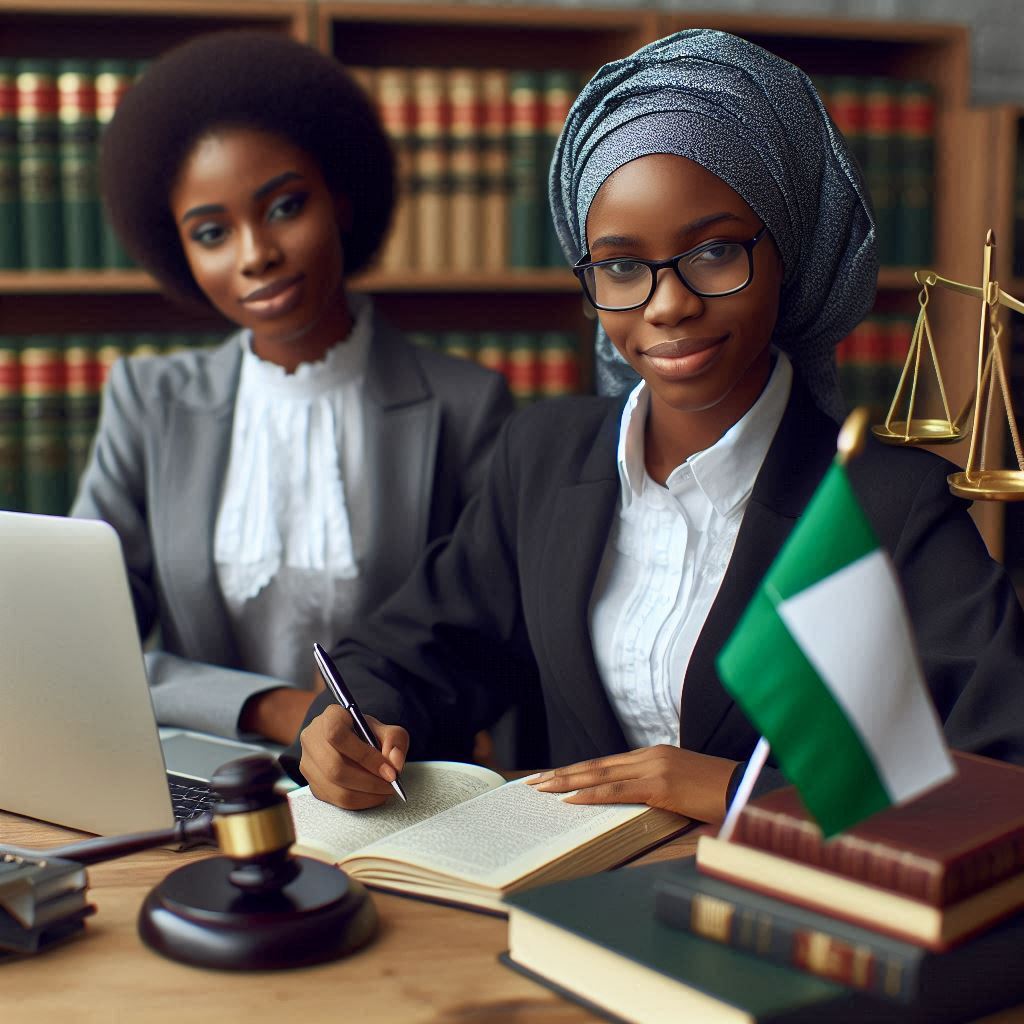Introduction
Nigeria actively participates in international legal organizations, playing a crucial role in shaping global legal frameworks.
Its contributions significantly influence the development and implementation of international law.
Nigeria’s involvement in these organizations is essential for promoting legal standards, economic stability, and social development both regionally and globally.
Nigeria, a member of the United Nations, also joins the African Union and participates in the Economic Community of West African States (ECOWAS).
Within the United Nations, Nigeria works on various legal committees to foster international cooperation and uphold human rights.
Nigeria creates and enforces legal frameworks in the African Union to address conflict resolution and protect human rights.
Nigeria’s role in ECOWAS is particularly notable for its efforts in enhancing economic stability and social development through legal means.
Through these affiliations, Nigeria plays a pivotal role in driving legal advancements and fostering international collaboration.
Historical Background of Nigeria’s Involvement in International Legal Organizations
Overview of Nigeria’s journey in joining global legal groups
Since gaining independence from Britain in 1960, Nigeria has actively evolved its involvement in international legal organizations.
Nigeria participates in various global legal bodies and initiatives to advance its interests and contribute to international law and governance.
The country is an active member of the United Nations, contributing to peacekeeping missions and international policy-making.
The country plays a significant role in the African Union, influencing policies on security, economy, and human rights.
Nigeria is also a founding member of the Economic Community of West African States, promoting regional integration and stability.
Furthermore, Nigeria supports the International Criminal Court’s efforts to address crimes against humanity.
Nigeria’s involvement in these organizations demonstrates its commitment to international cooperation and legal governance.
By engaging with these bodies, Nigeria aims to strengthen its diplomatic ties and enhance its global standing.
Nigeria’s active participation reflects its dedication to promoting peace, security, and development both regionally and globally.
Through these efforts, Nigeria continues to shape its role in the international legal landscape.
Early Engagement
These memberships enabled Nigeria to engage actively in global legal discussions, diplomacy, and cooperative efforts.
The country addressed various issues, including human rights, economic development, and international peacekeeping.
In the United Nations, Nigeria participated in debates, resolutions, and peacekeeping missions.
It contributed troops and resources to conflict zones worldwide.
The Commonwealth of Nations provided Nigeria with a platform to collaborate with former British colonies.
This collaboration fostered mutual support, trade agreements, and cultural exchanges.
Regional Leadership
These regional bodies offer platforms for collaboration on legal frameworks, conflict resolution, and regional integration.
Nigeria’s involvement demonstrates its commitment to regional stability and development.
Through ECOWAS, Nigeria works on harmonizing laws across West African countries, ensuring uniformity in legal standards and practices.
Nigeria also actively participates in conflict resolution within ECOWAS, showcasing its dedication to maintaining peace and security.
In the African Union, Nigeria contributes to policy-making processes and supports initiatives aimed at regional integration and economic growth.
Nigeria’s participation helps shape continental policies, underscoring its dedication to Africa’s progress.
By engaging in these organizations, Nigeria promotes peace and security, advocates for good governance, and supports human rights.
Nigeria’s actions reflect its leadership in regional affairs and foster cooperation among African nations.
Impact of Colonization on Nigeria’s Legal System and International Relations
Colonial Legal Legacy
British colonization significantly shaped Nigeria’s legal system by introducing English common law, legal institutions, and administrative structures.
This legacy continues to influence Nigeria’s approach to lawmaking, legal education, and the judiciary, with English common law principles remaining predominant in formal legal practice.
International Relations
Colonization also influenced Nigeria’s international relations, as the country inherited diplomatic ties and obligations established under British colonial rule.
Post-independence, Nigeria navigated its role in global diplomacy, advocating for decolonization, promoting African unity, and asserting its sovereignty in international forums.
Legal Pluralism
Nigeria’s legal system reflects a blend of customary law, Islamic law (in the northern regions), and English common law.
This legal pluralism, influenced by colonial and pre-colonial legal traditions, presents both challenges and opportunities in harmonizing diverse legal norms within domestic and international contexts.
Importance of Legal Organizations in Post-Colonial Nigeria
Promotion of Rule of Law
International legal organizations provide frameworks and standards that promote the rule of law, good governance, and respect for human rights in Nigeria.
Participation allows Nigeria to align its legal practices with global norms, enhancing legal certainty, transparency, and accountability.
Capacity Building
Membership in legal organizations facilitates capacity building through training programs, technical assistance, and exchanges of legal expertise.
These initiatives strengthen Nigeria’s legal institutions, improve legal education, and enhance the professionalism of its legal practitioners.
Diplomatic Influence
Nigeria’s participation in international legal organizations enhances its diplomatic influence, allowing the country to advocate for its interests.
Nigeria contributes to international legal reforms and shapes equitable and inclusive global governance frameworks.
In summary, Nigeria’s journey in international legal organizations underscores its commitment to global cooperation, adherence to international law, and advancement of national interests in a complex and interconnected world.
Colonization’s impact on Nigeria’s legal system and international relations shapes its engagement with global legal bodies. Legal organizations promote harmonization, development, and diplomacy in post-colonial Nigeria.
Read: How to Draft Legal Documents in Nigeria
Nigeria’s participation in regional legal organizations
Nigeria plays a crucial role in various African legal organizations, contributing to legal cooperation and development in the region.
Here is an overview of Nigeria’s role in African legal organizations:
Overview of Nigeria’s role in African legal organizations
- Nigeria is an active member of regional legal organizations, such as the Economic Community of West African States (ECOWAS) and the African Union (AU).
- It participates in regional legal forums, working towards the harmonization of legal frameworks and promoting legal cooperation among African countries.
- Nigeria’s engagement in regional legal organizations reflects its commitment to promoting peace, security, and stability in Africa through legal means.
Significance of Nigeria’s membership in ECOWAS, AU, and other regional bodies
- Nigeria’s membership in ECOWAS and the AU provides it with a platform to engage with other African countries on legal issues of mutual interest.
- It allows Nigeria to participate in regional efforts to address challenges such as terrorism, human rights abuses, and transnational crime.
- By being part of these organizations, Nigeria can contribute to the development and implementation of legal frameworks that promote regional integration and cooperation.
How Nigeria contributes to legal cooperation and development in Africa
- Nigeria shares its legal expertise and experience with other African countries, helping them strengthen their legal systems and institutions.
- It actively participates in capacity-building programs and initiatives to enhance legal education, training, and professional development in Africa.
- Nigeria plays a key role in promoting the rule of law, good governance, and respect for human rights within the region through its engagement in regional legal organizations.
Read: E-commerce Law and Regulations in Nigeria
Nigeria’s Role in Global Legal Organizations
Summary of Nigeria’s Participation in the United Nations and Its Specialized Agencies
United Nations Membership
Nigeria joined the United Nations (UN) on October 7, 1960, shortly after gaining independence. Since then, Nigeria has been an active member, contributing to various UN initiatives and participating in the General Assembly, Security Council, and numerous specialized agencies.
Security Council
Nigeria has served as a non-permanent member of the UN Security Council several times, most recently from 2014 to 2015. In this role, Nigeria has contributed to debates and resolutions on global peace and security, advocating for African interests and perspectives.
Specialized Agencies
Nigeria is a member of various UN specialized agencies, including the World Health Organization (WHO), United Nations Educational, Scientific and Cultural Organization (UNESCO), International Labour Organization (ILO), and United Nations Children’s Fund (UNICEF).
Through these agencies, Nigeria engages in global health initiatives, educational programs, labor rights advocacy, and child protection efforts.
Contribution of Nigeria to International Law and Human Rights Frameworks
Human Rights Advocacy
Nigeria has been a vocal advocate for human rights within the UN framework, participating in the Human Rights Council and supporting international human rights treaties.
Nigeria has ratified key human rights instruments, including the International Covenant on Civil and Political Rights (ICCPR) and the International Covenant on Economic, Social and Cultural Rights (ICESCR).
Peacekeeping Operations
Nigeria is a significant contributor to UN peacekeeping missions, providing troops and police for operations in conflict zones around the world.
Nigerian peacekeepers have served in missions in Liberia, Sierra Leone, Sudan, and the Democratic Republic of Congo, among others, promoting stability and protecting civilians.
International Law Development
Nigeria has contributed to the development of international law through participation in international legal bodies and conferences.
Nigerian legal experts have served on the International Law Commission and other UN bodies, helping to draft and refine international legal norms.
Challenges Faced by Nigeria in Upholding Global Legal Standards
Implementation of International Commitments
While Nigeria has ratified numerous international treaties and conventions, implementing these commitments domestically remains a challenge. Issues such as inadequate legislative frameworks, limited resources, and bureaucratic inefficiencies hinder effective implementation.
Human Rights Violations
Nigeria faces ongoing challenges in addressing human rights violations, including issues related to freedom of expression, police brutality, and the rights of women and children.
Incidents such as the #EndSARS protests against police brutality highlight the gap between international human rights standards and domestic practices.
Judicial Independence and Corruption
Ensuring judicial independence and combating corruption within the legal system are persistent challenges. Political interference, lack of accountability, and inadequate funding for the judiciary undermine the rule of law and hinder Nigeria’s ability to uphold global legal standards.
Conflict and Security Issues
Internal conflicts, such as the Boko Haram insurgency in the northeast and communal violence in various regions, pose significant obstacles to upholding international legal standards.
These conflicts strain Nigeria’s legal and institutional capacity to protect human rights and maintain the rule of law.
Nigeria’s active participation in global legal organizations reflects its commitment to international cooperation, human rights, and the development of international law.
Despite facing significant challenges in implementing international commitments and upholding global legal standards, Nigeria continues to play a crucial role in advocating for justice, peace, and human rights on the international stage.
Addressing these challenges requires continued efforts to strengthen legal institutions, promote good governance, and enhance the protection of human rights within the country.
Read: Legal Ethics and Corruption in Nigeria
Impact of Nigeria’s legal representation on the international stage
Nigeria’s legal representation on the international stage has had a significant impact in shaping global legal debates, advocating for justice and the rule of law, and leading successful legal initiatives.
Nigerian legal professionals and the country’s legal expertise have contributed to various international legal efforts, showcasing Nigeria’s influence and commitment to global legal standards.
Influence of Nigerian Legal Professionals in Shaping Global Legal Debates
Prominent Legal Figures
Nigerian legal professionals have held influential positions in international legal organizations. For example, Judge Bola Ajibola served as a judge at the International Court of Justice (ICJ) from 1991 to 1994, contributing to important rulings and legal opinions.
International Law Commission (ILC)
Nigerian representatives in the ILC have been instrumental in drafting and promoting international legal frameworks. Their contributions help shape treaties, conventions, and legal principles that govern international relations and human rights.
Academic Contributions
Nigerian legal scholars, such as Professor Dakas C.J. Dakas, have significantly influenced international legal scholarship.
Their research and publications on topics like international humanitarian law, human rights, and African legal systems enrich global legal debates and foster a deeper understanding of complex legal issues.
How Nigeria’s Legal Expertise Helps in Advocating for Justice and Rule of Law Worldwide
Human Rights Advocacy
Nigerian legal experts and activists have been at the forefront of advocating for human rights globally. By participating in UN Human Rights Council sessions, submitting reports, and engaging in advocacy campaigns, they highlight human rights abuses and push for international action.
Peacekeeping and Conflict Resolution
Nigerian legal professionals contribute to peacekeeping missions by providing legal expertise in conflict resolution, drafting peace agreements, and ensuring adherence to international legal standards. This work is crucial in establishing rule of law in post-conflict regions.
Capacity Building and Technical Assistance
Nigeria’s legal professionals engage in capacity-building initiatives, offering technical assistance to other countries in developing legal frameworks. This includes helping draft constitutions, creating legal codes, and training judicial officers, thereby promoting justice and legal development.
Examples of Successful Legal Cases and Initiatives Led by Nigeria in International Organizations
Bakassi Peninsula Dispute
- Case: Nigeria and Cameroon had a long-standing dispute over the Bakassi Peninsula, which was resolved through legal channels.
- Outcome: The International Court of Justice (ICJ) ruled in favor of Cameroon in 2002. Nigeria adhered to the ICJ’s ruling and peacefully handed over the territory in 2008.
Ebola Response in West Africa
- Initiative: During the Ebola outbreak in West Africa, Nigerian legal and health professionals played a key role in crafting legal and health responses.
- Outcome: Nigeria’s effective containment of the Ebola virus within its borders was lauded internationally. Nigerian experts helped develop frameworks for public health law and emergency response, contributing to global health security.
African Charter on Human and Peoples’ Rights
- Contribution: Nigeria was instrumental in the drafting and adoption of the African Charter on Human and Peoples’ Rights, a key document that outlines human rights standards for African countries.
- Outcome: The charter, adopted by the Organization of African Unity (now African Union), has become a cornerstone of human rights protection in Africa. Nigeria’s legal input helped shape its provisions, ensuring comprehensive human rights coverage.
Nigeria’s legal representation on the international stage has significantly influenced global legal debates, promoted justice, and upheld the rule of law.
Nigerian legal professionals have shaped international legal frameworks, contributed to resolving disputes peacefully, and led successful initiatives in various international organizations.
Through these efforts, Nigeria demonstrates its commitment to advancing global justice and maintaining the rule of law.
Read: Property Rights and Inheritance Law in Nigeria

Challenges and criticisms faced by Nigeria in international legal organizations
As Nigeria participates in various international legal organizations, it faces several challenges and criticisms that impact its reputation and effectiveness. Let’s delve into some of these issues:
Analysis of criticisms regarding Nigeria’s commitment to international legal principles
- Nigeria has been criticized for not fully adhering to international legal principles and obligations.
- There are concerns about Nigeria’s inconsistency in implementing international legal agreements and treaties.
- The lack of transparency and accountability in Nigeria’s legal system has also been a subject of criticism.
- Some critics argue that Nigeria prioritizes its national interests over global legal norms.
Discussion on challenges of corruption, lack of resources, and political interference
- Corruption remains a pervasive problem within Nigeria’s legal sector, affecting its credibility in international organizations.
- The shortage of resources, including funding and trained personnel, hinders Nigeria’s active participation and contribution.
- Political interference in legal matters undermines the independence and impartiality of Nigeria’s legal system.
- These challenges not only weaken Nigeria’s position in international legal organizations but also erode trust in its ability to uphold the rule of law.
Steps taken by Nigeria to address these criticisms and improve its reputation in legal circles
- Nigeria has initiated anti-corruption measures and reforms to combat endemic corruption within its legal institutions.
- Efforts are being made to increase investment in legal infrastructure, training programs, and technology to enhance legal capabilities.
- Steps have been taken to reduce political interference in legal affairs and promote judicial independence and impartiality.
- Nigeria is actively engaging with international partners and legal organizations to strengthen its commitment to upholding international legal principles.
- By addressing these criticisms and challenges, Nigeria aims to enhance its standing in the global legal community and contribute effectively to international legal frameworks.
In essence, while Nigeria faces significant challenges and criticisms in international legal organizations, it is actively taking steps to address these issues and improve its reputation.
By strengthening its commitment to international legal principles, combating corruption, enhancing resources, and reducing political interference, Nigeria can overcome these obstacles and play a more prominent role in shaping global legal frameworks.
Future prospects for Nigeria’s role in international legal organizations
Potential for Nigeria to take on leadership roles in global legal bodies
Nigeria has the potential to become a key player in international legal organizations. With its growing economy and influence in Africa, Nigeria has the opportunity to lead discussions and decisions in global legal bodies.
By taking on leadership roles, Nigeria can help shape international legal frameworks that are fair, just, and beneficial for all countries involved.
Nigeria’s participation in global legal organizations can also enhance its reputation as a responsible and engaged member of the international community.
Importance of continued engagement in shaping international legal frameworks
Continued engagement in shaping international legal frameworks is crucial for Nigeria. By actively participating in discussions and negotiations, Nigeria can ensure that its interests are represented and protected on the global stage.
Moreover, Nigeria’s involvement in shaping international legal frameworks can help address pressing issues such as human rights violations, environmental protection, and conflict resolution.
Through its engagement in international legal organizations, Nigeria can contribute to the development of a more just and equitable world order.
Opportunities for Nigeria to contribute to peacekeeping, conflict resolution, and human rights advocacy on the global stage
Nigeria has the opportunity to make significant contributions to peacekeeping, conflict resolution, and human rights advocacy on the global stage.
As a country with a history of participating in peacekeeping missions, Nigeria can continue to play a vital role in promoting peace and stability in conflict-affected regions.
Additionally, Nigeria’s commitment to human rights advocacy can help raise awareness of human rights violations and promote accountability for perpetrators.
By actively engaging in these areas, Nigeria can demonstrate its commitment to international peace and security and contribute to a more just and peaceful world.
Transform Your Career with Expert Guidance
Get personalized mentorship consulting that’s tailored to your unique path. Our expert advice is actionable and exclusive.
Get StartedConclusion
Nigeria has made significant contributions to international legal organizations.
Nigerian professionals have shaped global legal debates and promoted human rights through active engagement.
Nigeria’s role in peacekeeping missions underscores its commitment to maintaining the rule of law worldwide.
Nigerian legal experts have influenced the development of international legal frameworks, ensuring that global legal standards are robust and inclusive.
Nigeria’s participation in the International Court of Justice demonstrates its dedication to peaceful conflict resolution and adherence to international legal norms.
As we look to the future, it is imperative for Nigeria to continue promoting legal cooperation and upholding global legal standards.
Nigeria must lead initiatives that strengthen international legal institutions and advocate for reforms that reflect contemporary global challenges.
By actively engaging in international legal organizations, Nigeria can enhance its influence and ensure that its voice is heard in shaping global legal policies.




